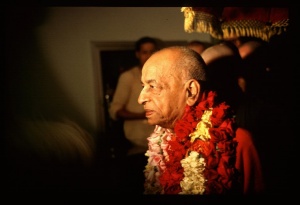CC Antya 8.8: Difference between revisions
No edit summary |
(Vanibot #0054 edit - transform synonyms into clickable links, which search similar occurrences) |
||
| Line 17: | Line 17: | ||
<div class="synonyms"> | <div class="synonyms"> | ||
''paramānanda-purī'' | ''[//vanipedia.org/wiki/Special:VaniSearch?s=paramānanda&tab=syno_o&ds=1 paramānanda]-[//vanipedia.org/wiki/Special:VaniSearch?s=purī&tab=syno_o&ds=1 purī]'' — Paramānanda Purī; ''[//vanipedia.org/wiki/Special:VaniSearch?s=kaila&tab=syno_o&ds=1 kaila]'' — did; ''[//vanipedia.org/wiki/Special:VaniSearch?s=caraṇa&tab=syno_o&ds=1 caraṇa]'' — unto the feet; ''[//vanipedia.org/wiki/Special:VaniSearch?s=vandana&tab=syno_o&ds=1 vandana]'' — offering obeisances; ''[//vanipedia.org/wiki/Special:VaniSearch?s=purī&tab=syno_o&ds=1 purī]-[//vanipedia.org/wiki/Special:VaniSearch?s=gosāñi&tab=syno_o&ds=1 gosāñi]'' — Rāmacandra Purī; ''[//vanipedia.org/wiki/Special:VaniSearch?s=kaila&tab=syno_o&ds=1 kaila]'' — did; ''[//vanipedia.org/wiki/Special:VaniSearch?s=tāṅre&tab=syno_o&ds=1 tāṅre]'' — unto him; ''[//vanipedia.org/wiki/Special:VaniSearch?s=dṛḍha&tab=syno_o&ds=1 dṛḍha]'' — strong; ''[//vanipedia.org/wiki/Special:VaniSearch?s=āliṅgana&tab=syno_o&ds=1 āliṅgana]'' — embracing. | ||
</div> | </div> | ||
Latest revision as of 21:02, 19 February 2024

A.C. Bhaktivedanta Swami Prabhupada
TEXT 8
- paramānanda-purī kaila caraṇa vandana
- purī-gosāñi kaila tāṅre dṛḍha āliṅgana
SYNONYMS
paramānanda-purī — Paramānanda Purī; kaila — did; caraṇa — unto the feet; vandana — offering obeisances; purī-gosāñi — Rāmacandra Purī; kaila — did; tāṅre — unto him; dṛḍha — strong; āliṅgana — embracing.
TRANSLATION
Paramānanda Purī offered respects at the feet of Rāmacandra Purī, and Rāmacandra Purī strongly embraced him.
PURPORT
Because Rāmacandra Purī was a disciple of Mādhavendra Purī, both Paramānanda Purī and Śrī Caitanya Mahāprabhu offered him respectful obeisances. Śrīla Bhaktisiddhānta Sarasvatī Ṭhākura comments that although Rāmacandra Purī was naturally very envious and although he was against the principles of Vaiṣṇavism—or, in other words, against the principles of the Supreme Personality of Godhead and His devotees—common people nevertheless addressed him as Gosvāmī or Gosāñi because he was superficially in the renounced order and dressed like a sannyāsī. In the modern age the title gosvāmī is used by a caste of gṛhasthas, but formerly it was not. Rūpa Gosvāmī and Sanātana Gosvāmī, for example, were called gosvāmī because they were in the renounced order. Similarly, because Paramānanda Purī was a sannyāsī, he was called Purī Gosvāmī. By careful scrutiny, therefore, one will find that gosvāmī is not the title for a certain caste; rather, it is properly the title for a person in the renounced order.